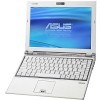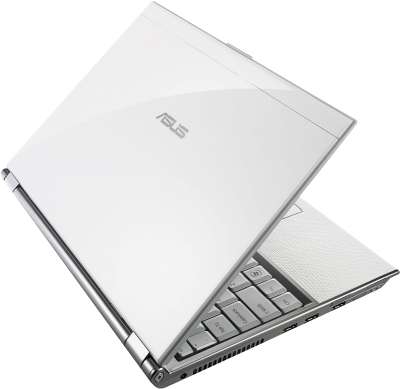- Qualcomm Launches Snapdragon 4 Gen 2 Mobile Platform
- AMD Launches Ryzen PRO 7000 Series Mobile & Desktop Platform
- Intel Launches Sleek Single-Slot Arc Pro A60 Workstation Graphics Card
- NVIDIA Announces Latest Ada Lovelace Additions: GeForce RTX 4060 Ti & RTX 4060
- Maxon Redshift With AMD Radeon GPU Rendering Support Now Available
ASUS U6E 12.1″ Notebook

Mobile computing doesn’t have to be boring – the U6E from ASUS proves that. Within its 12-inch frame is some of the best styling around and very competent hardware, along with a full-sized keyboard, fingerprint reader and four USB ports. Does this small notebook win big time?
Page 1 – Introduction
|
|
The term ‘bigger is better’ gets thrown around a lot, but it’s not one that’s often used when talking about computers. In some cases, bigger is better, because it represents extreme and raw power, while compact machines usually offer moderate performance. But as our lifestyles evolve, it becomes increasingly evident that most of the time, smaller is better.
I used to be one of those guys who always did believe that bigger was better when it came to notebooks. Actual performance aside, I enjoyed the larger screens and much more comfortable keyboards. But we’re at a time where we are on the go all the time, and carrying a 12lb notebook is not that much fun anymore.
We first saw a real surge in small notebooks with ASUS’ own launch of the Eee PC, a 7.1″ offering that was designed for those who wanted ultimate portability. But, it wasn’t for everyone, namely because you couldn’t fit the entire OS on a single screen, nor was the keyboard that feasible for anyone with big fingers. I won’t even touch on the performance aspect.
But that launch proved incredibly successful, and showed how desirable small notebooks can be. But, I’m not willing to sacrifice that much functionality just to shed a few extra pounds, or to have something smaller. Plus, with these sub-notebooks now hitting 10″, you might as well just go for the next step up and get a real notebook – one that offers real performance and a nice resolution. That’s why I personally feel that 12″ notebooks are as close to the perfect size as we can get.
How small should we go?
Allow me to go a little off course for a moment. As I mentioned a moment ago, I’ve always been one of those people who preferred a robust notebook over a small one. To me, ‘small’ meant ‘weak performance’, and as an enthusiast, it’s hard to just sit down in front of a machine with slow parts and be satisfied. But I clued in… large notebooks are nice, but lugging them around is not. Plus, who isn’t always on the go nowadays? We all are, and that’s when owning a smaller notebook is a blessing.
 |
I don’t fly all that often, but I do fly enough to care about the size of the notebook I bring on-board. I have made the mistake time and time again of bringing a 15.4″ notebook on a flight, but I quickly came to me senses and admitted I’ve had enough. That’s when I began becoming increasingly interested in smaller notebooks, and I’m sure glad I did.
If you have ever brought a full-sized notebook on the plane and sat in coach, you are no doubt aware of the downsides. Personally, I seem to have great luck in being seated behind someone ignorant enough to not look behind before slamming the seat back. There was one particular occasion on a flight last fall where I swore the notebook I was using was going to lose its screen, but luckily enough, it was fine.
With a 12.1″, though, it’s almost impossible for this to be a problem. I gave this theory a good test this month when I spent over 35 hours on various planes, thanks to my Computex trip. On most of the longer flights I had, I did have people in front of me shift their seat back without warning, but because of the small frame of the notebook, there was always enough leeway so that it wouldn’t be caught in a bad spot. On the three planes where I used the notebook (Boeing 77L, Boeing 747-400 and Airbus A320), I didn’t experience any real issue. It was a huge relief.
That’s the cool thing about a smaller notebook. It’s flexible. It can fit places where larger notebooks can have issue. But, not all 12″ notebooks are created equal, and some can be designed in such a way that the size might be the only benefit. Luckily, ASUS has done a great job on their U6E, and I’ll touch on all of the highs and lows in this article.
|
|
Support our efforts! With ad revenue at an all-time low for written websites, we're relying more than ever on reader support to help us continue putting so much effort into this type of content. You can support us by becoming a Patron, or by using our Amazon shopping affiliate links listed through our articles. Thanks for your support!





